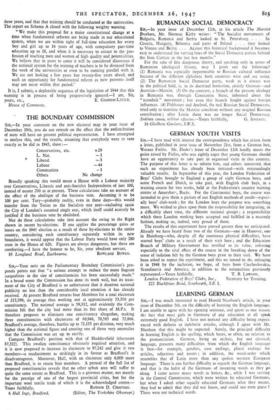THE BOUNDARY COMMISSION
StR,—In your comment on the new electoral map in your issue of December 19th, you do not remark on the effect that the redistribution of seats will have on present political representation. I have attempted to analyse this, and the results, assuming that everybody were to vote exactly as he did in 1945, show:—
Conservatives, etc. +29 L. Nat.
• Liberal.
Labour ,-44 Communists —1 Others No change Broadly speaking this would mean a House with a Labour majority over Conservatives, Liberals and anti-Socialist Independents of just 100, instead of nearer 200 as at present. These calculations take no account of the effect of the abolition of the business vote. Assuming it to be 100 per cent. Tory—probably rashly, even in these days—this would transfer from the Tories to the Socialists one _Fat—excluding again the City of London's assumed single seat, which itself could scarcely be justified if the business vote be abolished. Nor do these calculations take into account the swing to the Right shown in recent by-elections. If one applies the percentage gains or losses on the 1945 election as a result of these by-elections to the entire country, considering each constituency separately within its new boundaries, it would appear that the Labour Party would have only 280 seats in the House of 620. Figures are always dangerous, but these are comforting.—I have the honour to be, Sir, your obedient servant, 85 Longlarzd Road, Eastbourne. ROWLAND BOWEN.
Sta,—Your note on the Parliamentary Boundary Commission's pro- posals points out that "a serious attempt to reduce the more flagrant inequalities in the size of constituencies has been successfully made." In a broad sende the Commission has done its work well, but its treat- ment of the City of Bradford is so unfortunate that it deserves national publicity no less than the considerable local attention it has already received. At present Bradford returns four Members for a total electorate of 213,399, its average thus working out at approximately 53,350 per constituency. The national average is 59,312, and evidently the Com- mission felt that the city had more than its fair share of M.P.s. It therefore proposes to eliminate one constituency altogether, making three constituencies with electorates of 69,948, 70,585 and 72,866. Bradford's average, therefore, hurtles up to 71,133 per division, very much higher than the national figure and creating one of those very anomalies that the Commission was set up to rectify.
Compare Bradford's position with that of Huddersfield (electorate 87,322). This swollen constituency obviously required attention, and it is now proposed to increase its electorate to 97,242 and give it two members—a readjustment as strikingly in its favour as Bradford's is disadvantageous. Moreover, Hull, with an electorate only 6,000 more than Bradford, is to retain four members. A perusal of the full list of proposed constituencies reveals that no other urban area will suffer to quite the same extent as Bradford. This is a grievous matter, not merely for the prestige of one of the largest provincial cities, but for the important wool textile trade of which it is the acknowledged centre.— 6 Hall Ings, Bradford. (Editor, The Yorkshire Observer.)






























 Previous page
Previous page